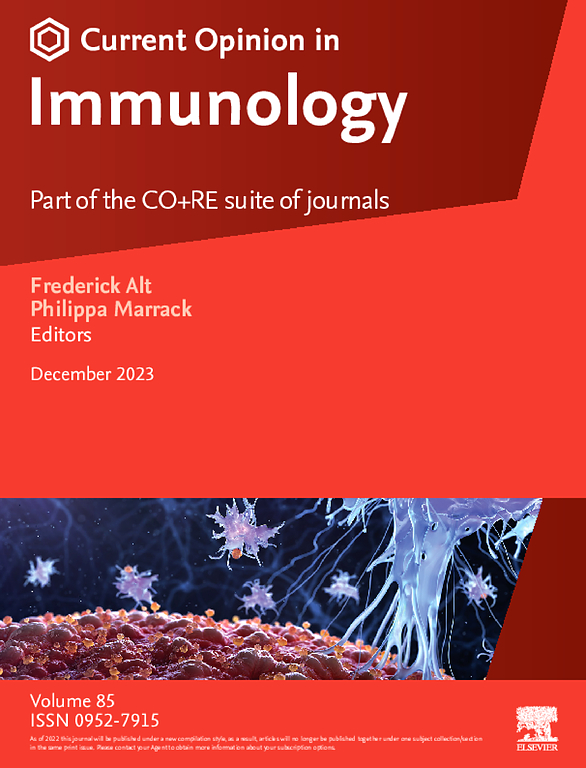防御者或叛逃者:自身免疫性疾病中粘膜相关的不变T细胞
IF 5.8
2区 医学
Q1 IMMUNOLOGY
引用次数: 0
摘要
粘膜相关不变T (MAIT)细胞识别MR1呈递的微生物核黄素代谢物,MR1是一种主要的组织相容性复合体i类蛋白。活化的MAIT细胞产生干扰素γ (IFNγ)、肿瘤坏死因子和白细胞介素-17等细胞因子;它们前往感染地点并参与保护性反应。它们在无菌小鼠中不存在,依赖于微生物。MAIT细胞不仅对感染有反应,而且在各种自身免疫性疾病中也有分析。一个趋势是,在自身免疫性疾病中,MAIT细胞在循环中减少,而在炎症部位增加、激活或耗尽。尽管可能具有致病作用,但出版物显示MAIT细胞也可以在组织修复中发挥作用。小鼠自身免疫性疾病模型支持这两种MAIT细胞功能的存在。在MAIT细胞反应中驱动炎症和组织修复平衡的信号仍有待充分阐明。本文章由计算机程序翻译,如有差异,请以英文原文为准。
Defenders or defectors: mucosal-associated invariant T cells in autoimmune diseases
Mucosal-associated invariant T (MAIT) cells recognize microbial riboflavin metabolites presented by MR1, a major histocompatibility complex class I–like protein. Activated MAIT cells produce cytokines such as interferon gamma (IFNγ), tumor necrosis factor, and interleukin-17; they traffic to sites of infection and participate in protective responses. They are absent in germ-free mice and are dependent on microbes. MAIT cells not only respond to infections but also have been analyzed in various autoimmune diseases. A trend is that in autoimmune disease, MAIT cells are decreased in the circulation and increased and activated or exhausted in the site of inflammation. Despite a possible pathogenic role, publications show MAIT cells also can function in tissue repair. Mouse autoimmune disease models support the presence of both these MAIT cell functions. The signals driving the balance of inflammatory and tissue repair in MAIT cell responses remain to be fully elucidated.
求助全文
通过发布文献求助,成功后即可免费获取论文全文。
去求助
来源期刊
CiteScore
13.30
自引率
1.40%
发文量
94
审稿时长
67 days
期刊介绍:
Current Opinion in Immunology aims to stimulate scientifically grounded, interdisciplinary, multi-scale debate and exchange of ideas. It contains polished, concise and timely reviews and opinions, with particular emphasis on those articles published in the past two years. In addition to describing recent trends, the authors are encouraged to give their subjective opinion of the topics discussed.
In Current Opinion in Immunology we help the reader by providing in a systematic manner: 1. The views of experts on current advances in their field in a clear and readable form. 2. Evaluations of the most interesting papers, annotated by experts, from the great wealth of original publications.
Current Opinion in Immunology will serve as an invaluable source of information for researchers, lecturers, teachers, professionals, policy makers and students.
Current Opinion in Immunology builds on Elsevier''s reputation for excellence in scientific publishing and long-standing commitment to communicating reproducible biomedical research targeted at improving human health. It is a companion to the new Gold Open Access journal Current Research in Immunology and is part of the Current Opinion and Research(CO+RE) suite of journals. All CO+RE journals leverage the Current Opinion legacy-of editorial excellence, high-impact, and global reach-to ensure they are a widely read resource that is integral to scientists'' workflow.

 求助内容:
求助内容: 应助结果提醒方式:
应助结果提醒方式:


